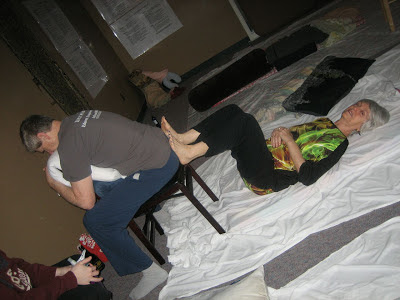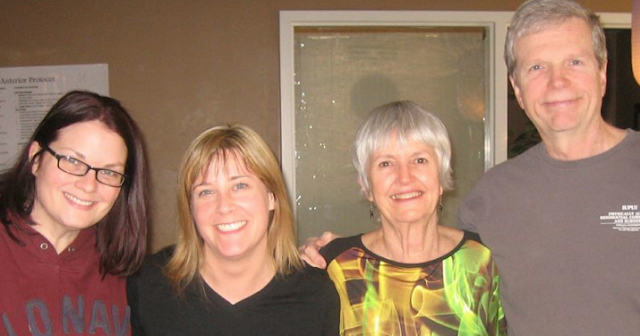 A few weeks ago, I hosted a Fijian Massage class with
founder Lolita Knight. (along with a few
other of her CE classes). With the help
of her “professional massage model” Mark, too of course!
A few weeks ago, I hosted a Fijian Massage class with
founder Lolita Knight. (along with a few
other of her CE classes). With the help
of her “professional massage model” Mark, too of course!
Lolita has been a practicing massage therapist for over 30
years. Here’s an article she has written
explaining the history of Fijian Massage.
My girlfriend Rosemarie is quarter Fijian, quarter Chinese
and half Kiwi. In 1998 we traveled to
Fiji to visit her relatives on several of the smaller of the Fijian Islands. On
the island of Kadavu, I met her cousin Simonis.
He was the village “massage therapist”.
On this island there were no roads, no electricity except for a few
generators, no indoor plumbing (outhouse), no hot water (a communal COLD WATER
shower instead) and of course no TV.
Despite this, living with her relatives was one of the most
wonderful experiences I have ever had.
It made me think a lot about my life and the role money plays in
it. The Fijian people have very little
financial resources, yet they live one of the richest lives I have ever
seen. LOVE is everywhere: especially for
the children. And LAUGHTER. I wanted to learn Fijian just so I could be
part of that ever-constant humor. Plus
FAITH: a faith that is rich in its strength and actions. The Fijian community made me feel so
welcomed, loved and for the first time I experienced unconditional love.
Rosemarie’s cousin Simonis, had wanted to give me a massage,
but I was on holiday. With 20 years of
massage experience, I wanted a break and felt I would need to give him some
lessons. So I put him off for a few
days. Finally I agreed and I was truly
amazed. I certainly wasn’t going to the
be the teacher. Simonis had a very rapt
student who wanted to learn everything he had to share.
Simonis had learned this massage, which I have called
“Fijian Massage”, when he was 7 years of age.
When any of the villagers had sore or damaged muscles, they would seek
out Simonis. Massage Therapy is not a
paid occupation for Simonis. He simply
gives of his time and talent to help his friends and neighbors. Sometimes he is very busy and his main
activity is attending his own plantation of taro and pineapple. Therefore, he doesn’t have a great deal of
time to spend giving massages.
I feel this is why such an effective massage technique has
been handed down generation to generation to generation. The people HAVE TO have strong and efficient
muscles to survive as their bodies are their source of transport, work is very
labor intensive and there is no social welfare for those unable to work. And the therapist doesn’t have an “hour” to
fix people so the method evolved that fixed people quickly.
In Fiji, the client would lie on the ground or a Fijian
woven mat and Simonis would use mainly his feet, sometimes his hands to release
the tension and repair the damaged tissue.
I have made many modifications to his technique to make it more
comfortable for both the client and the therapist. I have also created a method that ONLY uses
the feet to help save therapist’s hands from repetitive movement injury.
I am ever so grateful for the method that Simonis taught me
that I donate to the people in the Fijian villages as this can help them in
their difficult financial situations.
When I returned to New Zealand (where I had lived for 20
years), I felt that Kiwis would not relate to lying on the floor and me using
my feet to massage them. So for 6 months
I did not use the “FIJIAN MASSAGE”. Then
one day a client came to me with severe leg scar tissue and wanted to run a
marathon in 6 weeks. I knew the only way
to help him was with the Fijian Massage technique. He was desperate and willing to try anything
so I convinced him of the Fijian Massage done with my feet. He not only was able to run the marathon, but
also beat his previous best time. Then I
tentatively recommended that my regular clients try the Fijian Massage. Now over 80% of my clients prefer the Fijian
Massage to the other deep tissue sport massages that I offer.
Why is the Fijian Massage so popular? Mainly my clients want a deep massage that is
also relaxing. Prior to doing the Fijian
Massage I did Deep Tissue Cross Fiber Massage with a lot of my method using my
elbow. While it was pointed and got to
the troubled area, it was a “sharp” pain.
With the Fijian I do my main deep
work with my heel. This deep pressure is
softer that my elbow, yet it is a stronger stroke. Plus my clients find that the repair happens
much quicker with the Fijian Barefoot Massage.
If you think about it, the foot has stronger bones and the
leg muscles are more powerful than the arm.
Try this: rotate your lateral edge of your foot on the floor
laterally. Now put your hand on the
floor and do the same thing. It is
obvious that your foot is much, much stronger than your hand.
One thing I really enjoy with using my foot and leg (and
abdomen) is that not only does it relax the use of your hands, but it also
gives your legs and abdomen good workout; therefore adding more balance to your
own muscular structure.
 |
| Fijian To Go: working with client seated |
With the Fijian Massage you use your toes, lateral and
medial edge of your foot, the pad, bunion bone point, the base of your heel,
the edge of your heel and the back of your heel. You can massage all parts of your client
except the face.
When I reflect, I feel that it is amazing that this
technique that I learned quite by accident on a remote island in Fiji, where I
learned to accept cold showers as a pleasant way of life, is being taught all
over the world. I feel forever grateful
to the warm and amazing villagers on the remote island of Fiji that shared and
taught me a technique that I firmly believe will enhance deep tissue sport
massage for both the therapist and client.
Lolita is a great teacher with amazing energy. I’m so grateful I was able to learn from her
before her retirement! If you’re
interested in learning Fijian Massage, you can find classes offered from her
team of instructors by visiting FijianMassage.com.
 |
| Cindy (me), Ginger, Lolita, Mark |
Many thanks to Lolita and Mark for the wonderful class and many laughs!
Tweetable: Why is Fijian #massage so popular? via @BodyworkBuddy
Tweetable: Why is Fijian #massage so popular? via @BodyworkBuddy












No comments:
Post a Comment